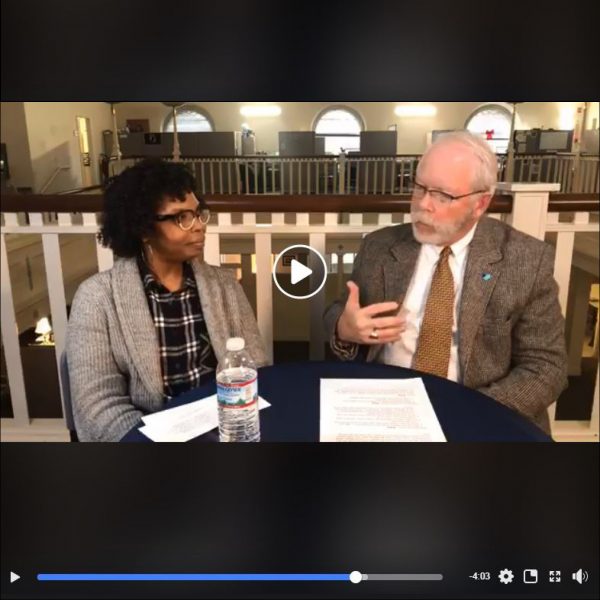On January 7, I participated in a Facebook Live event to discuss my role as Head Coach at Episcopal Community Services and how the agency is helping people move out of poverty—for good.
Our chief of programs, Arley Styer, and I fielded a number of questions about our agency, our work, and some of the challenges our participants face.In case you missed yesterday’s Facebook Live, here are some of the points we covered:
Why do we need to innovate in this sector?
Poverty in 1960 in America was 15%. In 2019, it remains 15% with an income level of approximately $22,900—unadjusted for inflation since the early 1970s, with safety net programs available at higher income levels.
However, for every dollar of additional income, benefits are reduced a dollar fifty, with some programs phasing out abruptly, or cliffing. The social service sector while providing essential services has done little to lower the level of poverty in America. In the Philadelphia region, poverty is in the 26-27% level, the highest of any major city.
Innovation is necessary, as programs at scale have not moved the needle on poverty. As an agency, we have made a commitment and investment to innovate and find programs that give our participants the opportunity to move out of poverty and stay there. Our ambition is to create scalable programs and partnerships to drive this innovation.
What do you mean when you say ECS is moving into the change business?
One could look at the many of the programs in social services and government that serve individuals living in poverty and make the argument that they are more about maintaining individuals, rather than driving change in individuals’ economic levels. We provide maintenance programs that provide stability and prevention—as do many well run agencies. However, poverty remains the dominant domestic long-term challenge costing some $60,000 per individual per year according to Pew studies.
In addition, no one living in poverty wants to be in poverty. In fact, individuals living with poverty are some of the most resilient people I know. At ECS, our focus is to create programs that drive economic change in individuals’ lives.
The long-term sustainable way out of poverty is a job at or above a living wage with benefits and a career path. Simply put: That is the change want for our participants.
As a result of our strategic plan (where we identified intergenerational poverty as our focus), we have identified brain science-based approaches that support individuals in poverty in order to help them lift themselves out of poverty. This approach is currently in use in some 80 other agencies around the country and has been shown to have significant results.
We are the only agency in Philadelphia using this approach. However, another change we hope to drive is to share our learnings and experiences and partner with other like-minded agencies. Maintenance has it place in our work, but long-term, we want to be in the change business.
You also refer to yourself as head coach. What is that in reference to?
The brain-based science that shapes our programs is based on a coaching model with financial incentives. Traditional case management often takes the form of telling a participant what to do or how to do an activity. Fill out this form; go to this agency; etc. To use the parable giving people a fish, coaching is about teaching people how to fish.
Our MindSet program uses coaching to help people assess where they are and what goals they have to improve their status. By coaching, setting goals, and providing financial rewards when goals are achieved, we teach people to fish.
My job is to hire and develop talent that is outstanding at this work, and to provide the best environment so they can do their best work. My title of Head Coach it is to remind my staff that we are all about coaching—not just our participants, but each other. It also gives me an opportunity to explain our focus as an agency to stakeholders after passing them my business card with this title printed.
Okay, last Dave-ism: What do you mean when you say we are working against the SPPs?
SPP is an acronym for “Stupid Public Policy.” Another part of our strategic plan is the creation of an advocacy effort in partnership with our stakeholders. Our focus is to advocate for changes to public policy and for regulations that are not in the best interest of our participants—and, in turn, our region. Many programs have not adapted with the times, and changes to them can and will drive significant impact at scale.
Internally we’ve been talking the three-legged stool of our programs: stability, prevention, and transformation. What do these mean to you? Do you think we need all of them?
Yes, we do need all of them. If you put these terms in the context of maintenance vs. change, it really frames out work. Remember, we have been at it for nearly 150 years, and many of our programs are well-established and well-regarded.
I think of our shelter and housing programs as providing stability for some of our most vulnerable participants. I think of our Out of School (OST) programs as prevention. They provide significant future opportunity for the student in our program as well as affordable childcare for working parents. Mindset and our workforce development program, the RISE Initiative, are all about driving economic transformation for individuals.
We also provide significant, and compassionate, volunteer opportunities through our senior visitation program, meal and gift delivery drives, and through various parish supported programs and partnerships.
And our coaching model is improving the quality of our work in all of our program areas—not just MindSet.
Over time, I would like the mix of stability, prevention, and transformation to shift more to transformational impact. As we partner with other agencies, I think just that will occur.

